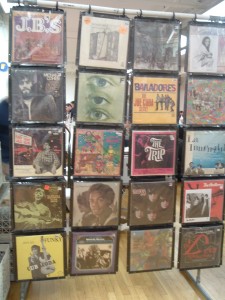Freeform community radio station WFMU is taking its love for radio to a new level this fall as they launch their first ever Radiovision Festival.
Coinciding with WFMU’s popular Record Fair, the multi-day festival “celebrating radio’s future” will take place in New York City October 28, 29 and 30th, 2011 and will feature performances, presentations, panel discussions, and an interactive radio hack day.
The array of activities will be a field day for radio fans and practitioners of all stripes. A contest during the festival could even land a lucky participant a shift on WFMU next summer. To get the low down on Radiovision, I talked to WFMU’s General Manager Ken Freedman.
Jennifer Waits: What inspired WFMU to create the Radiovision Festival?
Ken Freedman: I wanted to build on the success of the WFMU Record Fair, but also take it in a new direction. I want to offer something to people who are interested in radio and music, but in a forward-looking fashion. A lot of radio and music draw exclusively from the past. I was also frustrated by a lot of the tech/media conferences I’ve been going to, with their focus on fear and legalities and theory, as opposed to a focus on practice and technique.
Jennifer: Why do you think it’s important to hold Radio-focused events?
Ken: I think it’s more important than ever to explore how radio is evolving and changing and taking on new forms. The very question of “What is Radio?” is now debatable, which it never was before. It’s exciting to discuss these ideas with radio artists and digital pioneers.
Jennifer: What sorts of topics will be covered by the panel discussions?
Ken: There will be four panel discussions on Saturday, October 29:
1) Curating – Gathering a group of visionary curators to showcase that curation is not a buzzword or an aggregate dumping ground.
2) Business Model – What are the business models for artists, musicians and radio stations of the future?
3) Radio Origin Stories – Ira Glass, Tom Scharpling and Marc Maron will share the secrets stories behind their phenomenal success.
4) The Evolution of Web Communities and Digital Subcultures – This session will explore the core ethics, practices and values of web culture and where they come from, and how they’ve evolved as the internet has become part of daily life.
Jennifer: Can you explain the Radio Hack day?
Ken: WFMU and the Free Music Archive are inviting hackers, software developers, musicians, digital storytellers and DIY media-makers to devote a day to reinvent radio using images, social media, and open archive materials. How can radio best incorporate other streams of information along with a continual radio stream? We will be asking people to develop designs for combining the idea of radio with text, commentary, video, photos, illustrations, maps and more.
Jennifer: It seems like the conference not only will celebrate radio and its stars, but will also be exploring the art of radio as well as its future. Can you think of any other events that have taken on the topic of radio in such a way?
Ken: The Third Coast Audio Festival has always done a great job of celebrating and presenting radio from a practitioner’s viewpoint, which is part of what we plan to do.
Jennifer: Anything else?
Ken: We will also have a contest to develop a one hour weekly program that represents the idea of radio’s future. The winner will get a weekly airslot on WFMU the summer of 2012.



